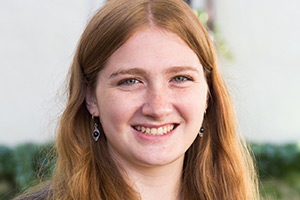Puppets and Paul Daniels: An interview with Paul Zerdin
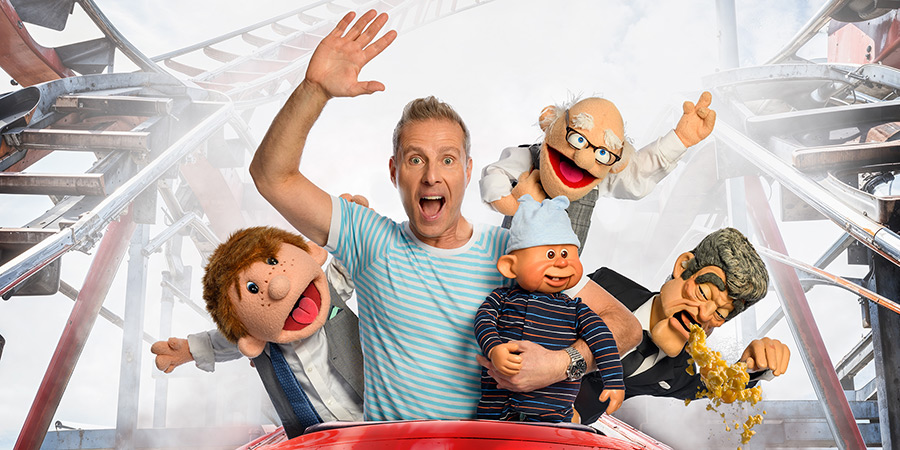
Paul Zerdin, the ventriloquist who won America's Got Talent, is bringing his next show, Jaw Drop, on tour later this year, starting in September in Norwich and going through until November, ending with a two-night run in London's Leicester Square Theatre. The show has Zerdin joined by a range of characters, including Sam and Albert, as well as the return of Alasdair Rimmer, who is determined to make a comeback.
Recently, we had the chance to speak with Zerdin about how he made the jump from magician to ventriloquist (while still keeping some of the magic!), his creative process for shows, and an incident at the airport involving lost luggage!
So, how did you first get started in the world of ventriloquism?
Well, I was a magician before I became a ventriloquist! When I was eight or nine, I knew that I wanted to be a magician because I'd been given a magic set for Christmas, and I really loved it.
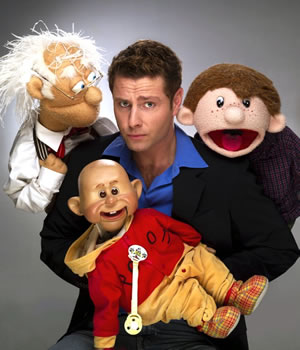
But I'd always had a big interest in puppets, in particular Sesame Street and The Muppets - anything that Jim Henson had created. But it wasn't until I was in my mid-teens that I was given a book on how to become a ventriloquist. That was shortly after I'd seen a performance on The Paul Daniels Magic Show, and there was a British ventriloquist called Ray Alan, and he had a character called Lord Charles. I was blown away - it was the first time I'd ever seen a ventriloquist! So I knew that that was something that I wanted to do, as well as the magic, because it was a way of doing the puppetry and the comedy, but also still being the star of the show. The Muppets and the puppets that I'd seen on television, the puppeteers were hidden underneath - I wanted to be very much in vision! So ventriloquism seemed like a really good idea.
So I spent a couple of years learning from the book. Then, when I left school, I got a job in a magic shop and started doing shows in restaurants and hotels. Close-up magic and kids parties at the weekends, and then more grown-up shows at night in nightclubs and all sorts of venues, and gradually phased out the magic and put in more of the ventriloquism and the stand-up comedy and the puppetry. And now, years later, more of the magic has come back into the show! Even though I've been using animatronics for quite some years, where the puppets come alive, I've been putting magic in, so I get to do some of my favourite magic in the show and the puppets try and ruin it for me!
My old man character, Albert, does magic in the show. On the last tour, we did an illusion called the Zig Zag Lady, where he put himself in the box, and because he was animatronic, he was inside talking. I was controlling him from the outside, but he was telling me what to do, so I put these blades through him and pulled the middle out. And so the magic has definitely come back into the show. It's a stand-up comedy show, but there's magic in there, and I've got puppets doing magic. It's all the things I love!
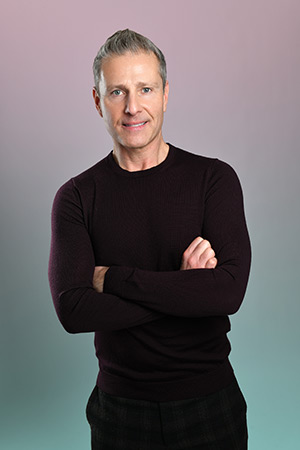
And what is it that you think drew you to magic and these puppets growing up?
I don't know! I think just watching shows. I used to go and sit in the audience when they were filming the Paul Daniels' show and other entertainment-type shows. I sat in the audience once of Opportunity Knocks, which was the Got Talent of its day on the BBC.
Bob Monkhouse, who was a performer that I'd seen on television and loved, was the host of that show. I just loved that whole world. And The Paul Daniels Magic Show, it was a variety show and it was all magic-based, but the acts that used to appear on the programme weren't all magicians. There would be a ventriloquist, an amazing comedy juggler, different speciality acts. So I knew that I wanted to do something in that world, but I wanted to be on television.
I'd fallen in love with all the Muppets on Sesame Street, and then The Muppet Show and Fraggle Rock. I remember seeing The Empire Strikes Back and the first thing I wanted to do was go to my local toy shop and buy a Yoda puppet! I just knew I wanted to be in show business and in a land of make-believe.
Can you tell us a bit about your current show, Jaw Drop?
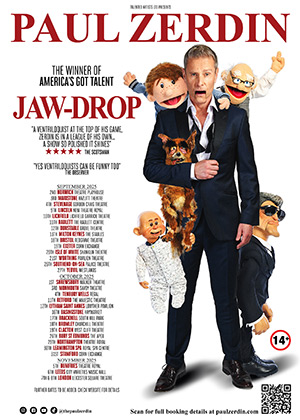
Jaw Drop is me and my three main characters - Sam, Albert and Baby. I have a bodyguard character that I've been developing over the last few years, who's been in the last couple of tours. He's an American bodyguard. I introduce him as when I won America's Got Talent they gave me a bodyguard and, even though that was quite a while ago, he's still here - I can't get rid of him! He's American, he's paranoid and he's a fun character to deal with. He's trying to interrogate the audience. He doesn't trust anybody. He can't understand why all these people have shown up! He thinks that someone must have leaked the information. And I have to explain to him I told people I was going to be there, and he can't believe that people want to be there. So he's quite stupid really, but he's a really fun character. And he's got an American accent as well, which is different from all the others, and a deep voice. And I got an Urban Fox who's very cheeky! He's down with the kids and he's got into the show by accident.
A lot of the show I talk about ventriloquism, being a grown-up and using it in everyday life. Obviously, I use it on stage to entertain, but I've also developed material where I talk about the fun that you can have as a ventriloquist without the puppet. There's a couple of sections in the show where there isn't a puppet, but there's still voices and things talking that are not puppet-based. I think the audience like that as well, because not many people have seen a ventriloquist doing ventriloquism and comedy without a puppet. So that's a fun thing that's always growing and changing.
I've been doing a thing where I get people out of the audience, and they become my human ventriloquist puppets. It's something that a lot of ventriloquists do, something I've been doing for a very long time. I've developed these animatronic masks that you put over someone's face and I can control the mouth. I don't have to be on stage with them. I can go and sit in the audience and control them. So I get people up from the audience and I'm controlling them. And they will do what I want them to do! It's all fun, and they'll never do anything they don't want to do, but it's amazing what people will go along with. It's a bit like being a hypnotist! So I got them doing magic on the last tour, and I've got them doing a whole new bit this year. There's so much fun you can have with it, so I love doing that. I didn't do a version of the routine one year on the tour, because I've been doing it for a long time now. Even though I changed the jokes up, I thought people must be bored with this now. So I didn't do it, and I had so many people saying to me, "You didn't do that bit where you get people out from the audience," and I was like, "Well, I thought you'd be bored with it!" "No, we love that!" That's very much back in the show!

I've got another character, called Alasdair. He's my continuity announcer, the MC between the characters, and he's an old school broadcaster - he's done radio and television. He had a stint hosting the news a long time ago, went out for a boozy lunch, came and did the news bulletin that evening and he was drunk on air and said some things to his co-host that he shouldn't have. He got sacked, so he's coming back from his cancelled time as a performer, and I'm giving him a leg up - I feel sorry for him. But he's a fun character! He's a mixture of all the characters that I grew up loving, like Alan Partridge, Anchorman, and those British broadcasters, the British institutions. There was a chap called Alan Freeman who used to host a show called Pick Of The Pops and he had a ridiculously over-the-top voice on radio. But I loved it! And so it's a mixture of all those old school broadcasters. And I did radio for a while!
I was on a satellite radio station for a while, and I started in hospital radio at the same time as I was doing magic and learning my craft. I also used to do airport information radio at Heathrow, so I've got some experience of hosting shows. Alasdair is a mixture of all these characters I grew up listening to on the radio and watching on telly, so he's fun. He did make a brief appearance a long time ago in one of my tours, but I hadn't quite got him right. I wasn't happy with him, so he was retired for a bit, but now he's coming back, and I think he's got a lot of potential.
What is the creative process for not only a show, but specifically the characters inside of it?
There's no set pattern, but I'm always thinking of jokes for the show and different ways of doing things. It takes me a long time to get the characters right. Sam is my longest-running character, and he's easy to write for because I know what he would and wouldn't say. The same goes for the Baby and Albert.
Roger, the bodyguard, I've found his character now. He's got this big, brash bravado, but deep down, he's actually terrified and I start to uncover it and find out what he's terrified of. And again, there's an element of that with Alasdair. He puts on this over-the-top, affected voice, but underneath, his life is in tatters. He's going through a terrible time, but he's hiding all of that - everything's all fine.
So these are characters that I like to think are relatable! Even though they are ridiculous and they're puppets, people can see something in themselves. Like the old man - I'm not taking the piss out of being old or ageing, but we're seeing some of the funny sides of the ageing process. Albert is 96 and my father, who we just lost before Christmas, was a great inspiration for Albert. As my dad's hearing got worse, he would mishear things all the time and say the funniest things, we would laugh about it, and I'd write it down because he knew it would be good material for Albert.

I like to think that the characters are relatable. It sounds a bit pretentious, but I like to think that there's a reason for the comedy. I'm not saying there's a storyline, but there's a reason for it. And some of the comedy comes from real-life situations, whether I've got to give Albert his medication, and he's accidentally taken some of my Viagra, or how the Baby is always picking up new words, rude words. So you've got these family-type situations that do happen. So I like to think that's where the inspiration comes for the material.
You have experience performing on television and shows like America's Got Talent, and also touring shows live. What is it like performing in these different mediums?
Well, I was lucky to get into television quite early, and I became a kids presenter when I was around twenty. I worked for GMTV for a couple of years, so I was, in a way, paid to learn how television works. That was a huge head start. And then I went and worked in holiday parks and working men's clubs, all sorts of different venues, then the comedy circuit - The Comedy Store, Jongleurs comedy clubs . . . A real mixture.
Then I did a talent show called The Big Big Talent Show on ITV, which was 1996, and I won that. That was a big platform and opened a lot of doors - I was able to appear on lots of other stand-up shows and light entertainment type shows. And so, having had that experience of working some quite hard venues before that, when you then appear on a Royal Variety show, you know that it's a TV show, but it's also a theatre full of people. Those shows can be quite a hard audience, because they've paid a lot of money for the ticket because it's going to a great charity, and a lot of them will be pros in the audience. When a pro is watching another pro, they don't always laugh, or they don't laugh outwardly, which is not helpful when you're trying to do comedy!
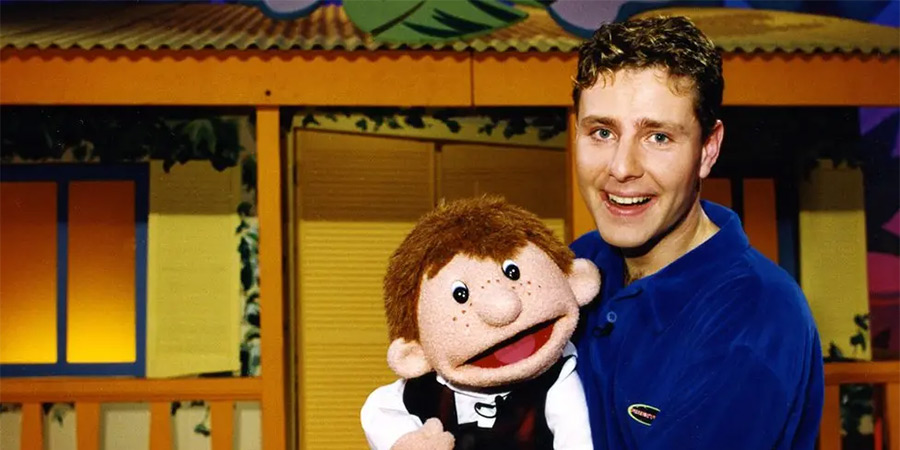
I remember the first Royal Gala I did for the Prince's Trust. It was 1997 and I was on with Bradley Walsh and the Spice Girls were on it... Phil Collins, Michael Barrymore... It was a big show to be on. And if you hadn't had much experience, that could be potentially terrifying! I was still nervous, but I was still very comfortable. It's a television show, but it's not a television show that you're used to, necessarily, because in a studio, you can see the cameras, it's a TV studio with an audience, whereas those kind of shows were a theatre which the TV crew were in. But's a live show - somehow you need to remember that there's millions of people watching it that night or soon after!
I love all the different mediums, really. And you need the television to promote the live show - they compliment each other, really. And obviously, the mediums are changing so quickly now, because you've got all these different streaming platforms, you've got YouTube, Instagram, TikTok - all these things are a whole new world with entertainment. It's adapting and it's ever changing. I love that, because it's exciting! And I love my YouTube channel - it's like, 'Paul Zerdin has his own channel! BBC One, ITV, The Paul Zerdin Channel'... I love that! You can go and watch all my specials on there. You might have to watch the odd advert, but in a way, it gives you much more control. You're not at the mercy of a commissioning editor at Network Centre or BBC or wherever.
I've done lots of pilots for television over the years, and I always get so far, then someone will come and put the kibosh on it. I love the fact that the way that it works now, is we are so much more in control.
And have you found differences in performing to audiences in the US versus the UK?
Yeah, definitely! One thing that really helped me was, before I did America's Got Talent, I had been working on cruise ships all over the world, and I'd been working for American cruise lines, so lots of American audiences. So I knew that most of my material worked for an American audience. So then, when I did appear on America's Got Talent, I felt very comfortable, because I knew that all the material was going to work. And between the audition and the judges cuts, where I got the Golden Buzzer, and then the live shows, which were in Radio City Music Hall, I was on and off cruise ships in the Mediterranean, in Scandinavia. I was backwards and forwards, and I was still entertaining American audiences. So I was thinking, "I know I'm going to do for my quarterfinals appearance, and I could try it out on the on the ships just prior to it!" So that was really helpful, and I didn't have to change much.
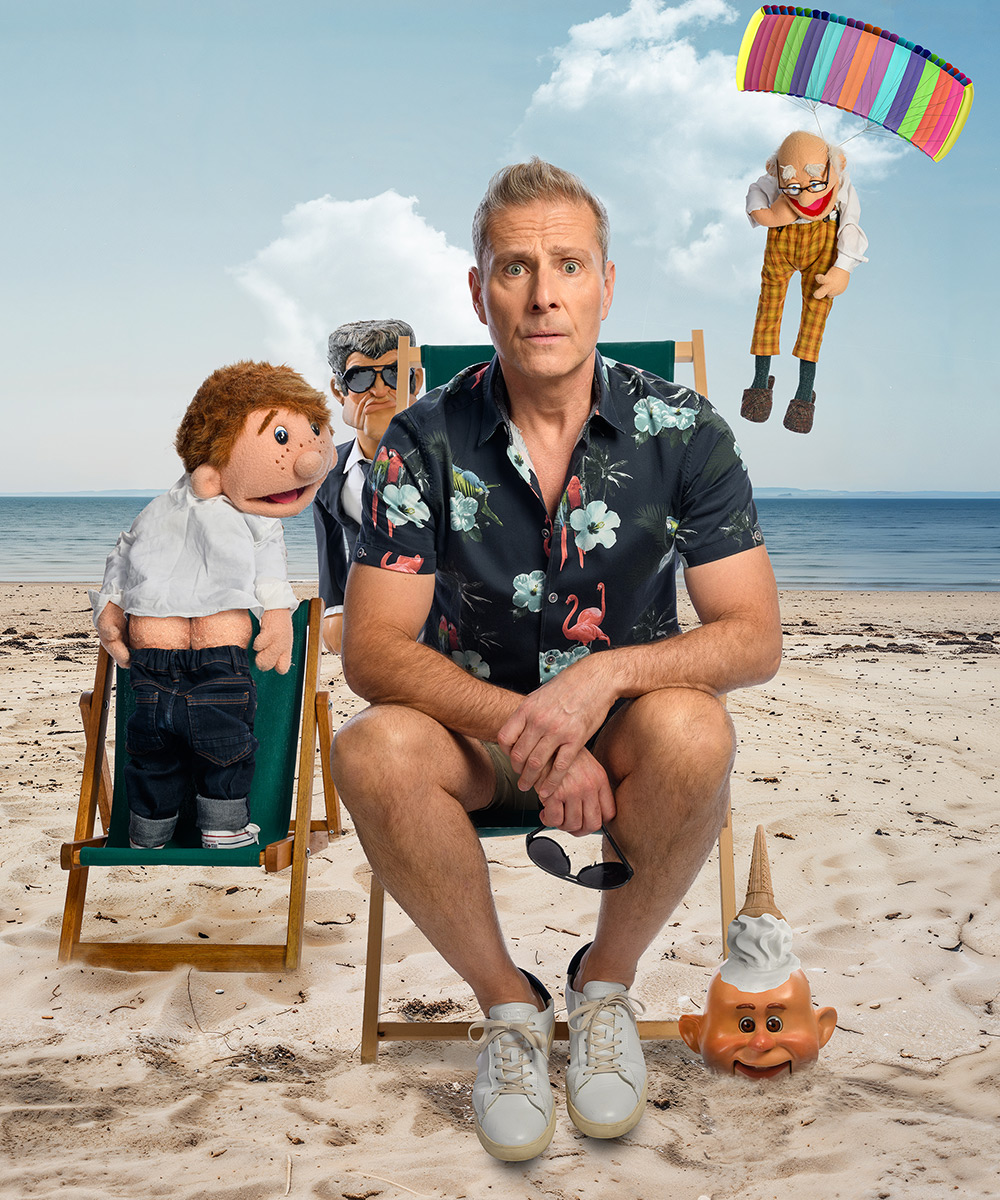
Obviously, I've got an English accent, and the Americans seem to love the English accent. But also, I'm conscious that, to them, it really is an accent, and I need to just slow down a bit, because British people generally talk very fast. So I was conscious of slowing down and changing the inflection on certain words. And, say, if I'm doing a joke about a pram or a push chair, it needs to be "stroller". I found that out quite early on the hard way, when a joke wasn't getting a laugh, I was thinking 'Well, what is it?', and then I realised that the word I was saying, it didn't make any sense to them! So simple things have made all the difference, but I love it!
I love being able to go to America and work. I have a residency at Jimmy Kimmel's comedy club at the moment, so I'm there selected weekends between now and August. And I love the fact that I can come home and tour here and I can go to Canada and do a casino. I can go around the world doing it, so I'm very fortunate.
Do you have any favourite memories from recent performances?
Well, I was doing a casino in Seattle last September, and I had just got my new three-year work visa for America - literally got it the day before. So it was touch and go whether I was going to be able to go or not. Anyway, I got it just in time, and depending on the size of the show and how long I'm doing, it would depend on the sort of suitcase I would take. So I have a bigger show which goes into a Peli Case, which is one of those big, plastic, military-grade cases you would check in. Now, I had been on and off ships last year, and I usually would have a couple of suitcases, one with my clothes and one with the characters and some animatronics and some show equipment. They had gone missing three times last year!
Oh, wow!
My Sam character was in a bag stuck in Barcelona Airport for three weeks, so that was a nightmare, but I've got spares at home. That sort of thing has happened a lot over the years, but never quite as much as last year. So three times, my baggage didn't make the connections. Then I go to Seattle and I check my Peli Case in. In my hand luggage, I've now got Sam, my radio-controlled masks and a few tiny bits that I use in the show. Well, the Peli Case landed in San Francisco, because I was connecting there. I had to collect it, then I had to check it back in and go through into the next bit. And I said to the guy, "This is going to make this flight, isn't it?" And he went, "Oh, yeah, sure!" ... "No, it's really important because I've got a show tomorrow night." And there was plenty of time! Well, it didn't make the connection, so my case arrived after I finished the show. I then had to rewrite the show! Luckily, I had my main character with me, my radio-controlled masks and lots of other material I can do without having a puppet. So I managed to do the show, and it was fine.
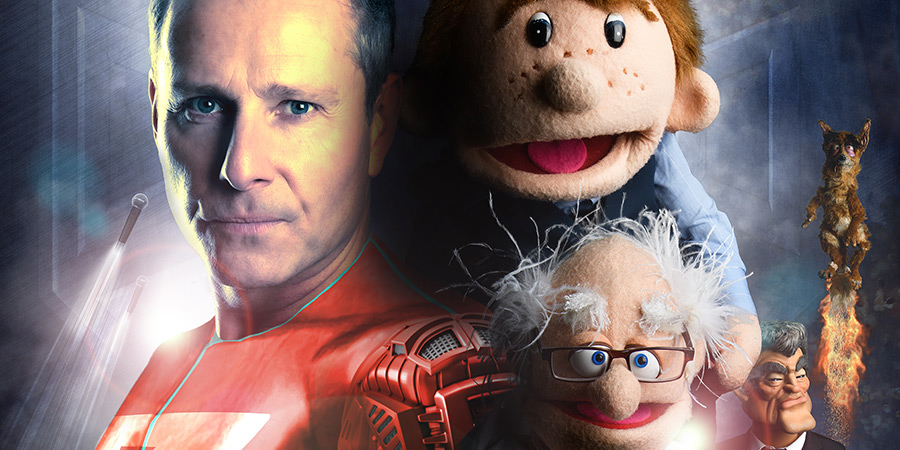
They were a fabulous audience, and the show went well. And so from that moment on, I thought, "I'm not checking luggage in anymore, because there's no point. I can't guarantee it's going to get there." So now my show is all carry on and not spending hours waiting and being the last person at the carousel, where there's me standing there. It's one o'clock in the morning, there's a baby car seat going around, and that's about it. That's the vision. If I ever do an autobiography, I think that would be the cover. Just me standing there, knowing I'm going to have to go to the lost luggage bit and spend an hour filling in forms and all that shit. I'm sick of that, so this is the way I do it now - it's all carry-on. But this tour, the UK Jaw Drop tour, we go around in a car, so I have all the other characters and all my stuff.
What advice do you have for those looking to get into ventriloquism?
Well, it's not that common to do it, and to want to do it - there aren't that many ventriloquists around, so I'm quite glad about that! But it does take a long time. You have to just try and be as good as you can. As a ventriloquist, technically, you want to be as good as you can. The most important thing, though, is to be funny. It's stand-up comedy, really, with or without a puppet. So the comedy is the most important thing, and you have to go out and get as much experience as possible. It's about being able to work in every possible scenario.
Quite early on, my first agent got me working in private functions and corporate dos. And some of those dos, you can be in a hotel room, you can go on really late - you're supposed to be on at 9:30, you can end up going on at 11pm because everything's overrunning. They're all drunk by this point, you might be in a room that's got pillars everywhere and they can't all see you. There's all sorts of things stacked up against you, and you have to somehow be able to make it work. And so, years of doing it, you find tricks and techniques.

It's just about getting as much experience as possible. I remember working for Butlin's during the pandemic, and we were doing shows outdoors. I've worked for Butlin's on and off for years and they've got fantastic venues indoors, all big LED screens. They're really technically quite advanced. And I had to do these shows outdoors, so they built these massive stages. At that time, we were doing three shows in an afternoon, and so I would be on at three, then half past four, and then six o'clock. Halfway through the second show, you suddenly think, "Oh, my God, I can't see anything," because the sun has moved round! Things like that. And then being heckled by a seagull that is so noisy, sitting on the roof, that it had to then become part of the show, because it couldn't be ignored. You don't think about things like that! So you've got all these extra things that you have to try and deal with and still make your show work. It's never ending. You're always learning and working with new, different environments.
So my advice is, get as much experience as you can, so that it gives you half a chance when you're working. I did some gigs in Iraq and Afghanistan a few years ago for the troops - some of the best gigs I've ever done. You'd be literally in the middle of the desert. Some of the gigs were massive, some of the gigs were tiny. You're in a war zone, so you're in and out of helicopters and stuff. It's never dull. There are so many different experiences. I've been very lucky and worked in all sorts of scenarios. I would do a gig in someone's back garden for a birthday party not that long ago, and I was being heckled by the pet dog. I took the puppet out, and this dog just freaked out when he saw the puppet. I've never been heckled by a dog before! So you just learn all these different situations, and you make the best of it.
And finally, how would you describe Jaw Drop in one word?
Silly.
Paul Zerdin: Jaw Drop tours from 2nd September to 8th November. More information & tickets
Help British comedy by becoming a BCG Supporter. Donate and join us in preserving, amplifying and investing in comedy of all forms, from the grass roots up. Advertising doesn't cover our costs, so every single donation matters and is put to good use. Thank you.
Love comedy? Find out more
